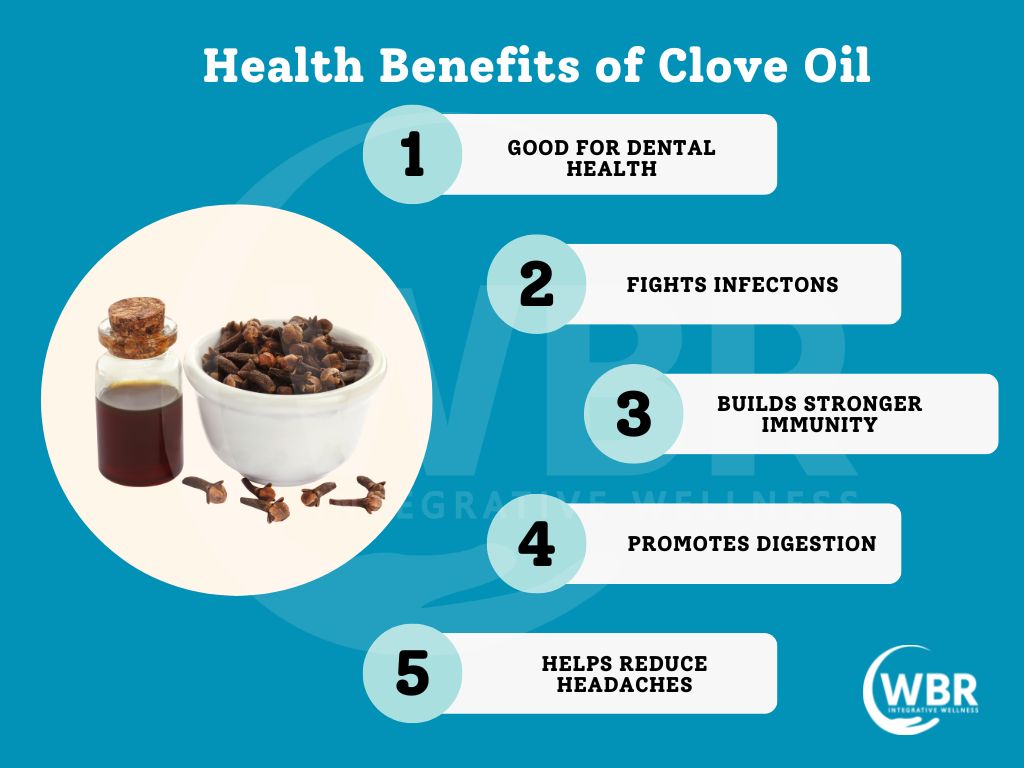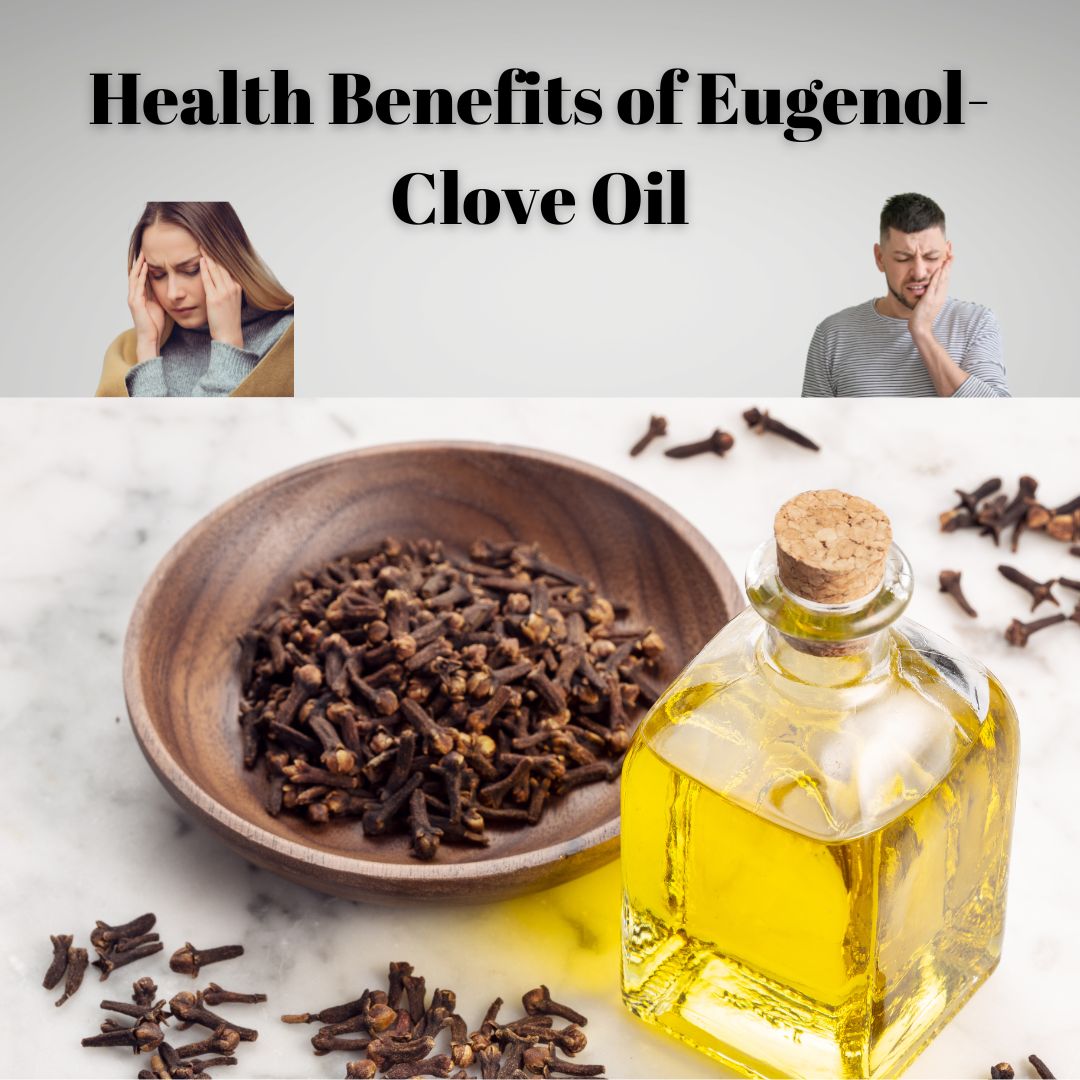Health Benefits and Clinical Use of Clove – Eugenol
Clove is a common ingredient found in our kitchen. But it is not just a good flavouring agent as it comes with clinical uses and health benefits. Clove is a medicinal plant since ancient days. Eugenol, a vital part of clove is what constitutes the valuable properties of clove. In this blog, we will discuss the health benefits and clinical uses of eugenol or clove oil.
Cloves, also known as Syzygium aromaticum come from the flower buds of a clove tree. We can find cloves in both whole and powdered forms. From being a flavouring agent to a medicinal ingredient, clove has got it all. Eugenol is the crucial part of clove that makes it clinically useful. Eugenol is an active ingredient in clove used to make clove oil. It gives an aromatic scent and medicinal properties to clove. People use clove oil or eugenol for its many benefits as it has antibacterial, antiviral and even anti-carcinogenic properties. Let us straight dive into what makes clove such an important ingredient.
Antibacterial benefits of Clove
Clove oil comes with many antibacterial properties. It can be used as a treatment for many different types of bacteria. It is effective against germ-positive, germ-negative mycobacteria, chlamydia and even staphylococci. The antibacterial functions or benefits of clove oil help fight bacterial infections on and inside the body. It helps eliminate harmful bacteria from the work and works toward fighting them.
Anticarcinogenic benefits of clove
Clove, in its natural form, comes with phenomenal cytotoxicity toward MCF-7 cells. It is thus a promising ingredient for developing anti-cancer agents to treat different types of cancers. Apart from this, clove produces apoptosis that works actively in a range of cancer cells. Cloves are a good source of elements like betulinic acid and triterpenes. Medical professionals use these ingredients as chemopreventive agents against breast cancer.
Antioxidant benefits of clove
Antioxidants are natural substances that protect cells from damage resulting from free radicals. Free radicals are unstable molecules that cause damage to cells and tissues. Antioxidants help prevent such damages. The eugenol present in clove oil makes it a great antioxidant. Eugenol acts as an antioxidant and helps fight free radicals in the body.
Antihistamine benefits of clove
Clove has many anti-inflammatory and antioxidant properties. The antioxidant properties or benefits of clove make it act as an antihistamine agent. As an antihistamine, clove helps fight stomach-related issues like indigestion, loose motions, vomiting, diarrhea and nausea. It also helps in fighting various infections caused due to high levels of histamine in the body.
Antidiabetic benefits of clove
Clove oil is an effective ingredient for diabetic patients. Eugenol helps in maintaining insulin levels in the body. Diabetes usually results in a weaker immune system that disrupts or destroys the pancreatic cells in the body. The decline in pancreatic cells results in an imbalance of insulin. Consuming cloves regulates the insulin levels and glucose response mechanism in the body.
Clinical Uses of Clove
Apart from the numerous health benefits of clove, there are multiple clinical uses of clove and eugenol. From toothaches to headaches, eugenol works on everything. Here are some of the primary clinical uses of clove.
SIFO (Small Intestine Fungal Overgrowth)
Clove/Eugenol has anti-fungal and anti-bacterial properties. It also has stimulatory effects on beneficial Clostridia species in the GI tract which in turn, helps strengthen the intestinal mucus barrier. Intestinal mucus is a critical barrier between microbes, digested food, bile and other factors and the intestinal lining. Any breakdown of the intestinal mucus barrier increases intestinal inflammation called as endotoxemia.
It is use as complimentary for the herbal treatment for Small Intestine Bacterial and Fungal Overgrowth (SIBO/SIFO).
Toothache relief
Clove oil or eugenol has multiple uses in dentistry. It is widely used to treat dental aches or pain. In some cases, it is also used as a local anaesthetic. Moreover, clove oil or eugenol is sometimes used as an oral disinfectant. Applying clove oil to an aching tooth can help relieve the pain to a great extent. Apart from this, clove oil is a good alternative to mouthwashes loaded with chemicals and alcohol. It is also used to treat canker sores and fight bad breath. Clove oil is a natural solution to many dental issues.
Headache relief
Clove oil has many benefits apart from curing oral health issues. Clove oil helps improve the circulation of blood in the body. Applying a cloth soaked in clove oil on the forehead helps open up the blood vessels. This helps in regulating a good flow of blood in the whole body. Proper blood circulation thus aids in fighting headaches, especially tension-type head pains. The aroma of clove oil also enhances the stimulation of the brain. Additionally, clove oil acts as an active agent for removing toxins from the blood.
Antiseptic benefits of clove: Burns and Cuts
Many individuals use clove oil as a topical treatment to reduce the pain of burns and cuts. People also apply it as a pain reliever for such burns and cuts. Not only this, but it is completely safe to use on children. But if the wound is deep, then a diluted version of clove oil is safe to use . Add coconut oil or almond oil to clove oil before applying it to a severe burn or cut. Clove oil has many benefits when it comes to treating wounds, cuts and burns.

Dosage recommendation
- Recommended dosage of clove in powdered form: 120-300 mg.
- Recommended dosage of clove oil: 0.05-0.2ml
- In case of toothaches, apply a few drops of edible essential clove oil mix in any essential oil such as coconut or olive oil directly on the aching tooth.
- For headaches, apply a towel or cloth soaked in clove oil few drops mix in an essential oil to the temple area.
- Clove spice tea by boiling whole cloves in water.
Note: Consult your doctor before using eugenol or clove oil any form for treating a medical condition.
Conclusion
Eugenol is a clinically beneficial element. There are many anti-bacterial, anti-viral, anti-diabetic and even anti-histamine benefits of eugenol. From treating toothaches to relieving headaches, eugenol or clove oil helps fight different health issues and comes with a lot of clinical benefits. Clove is essentially one of the most useful ingredients found in every household. Moreover, eugenol extracted from clove is an effective treatment for different health issues faced by individuals.









